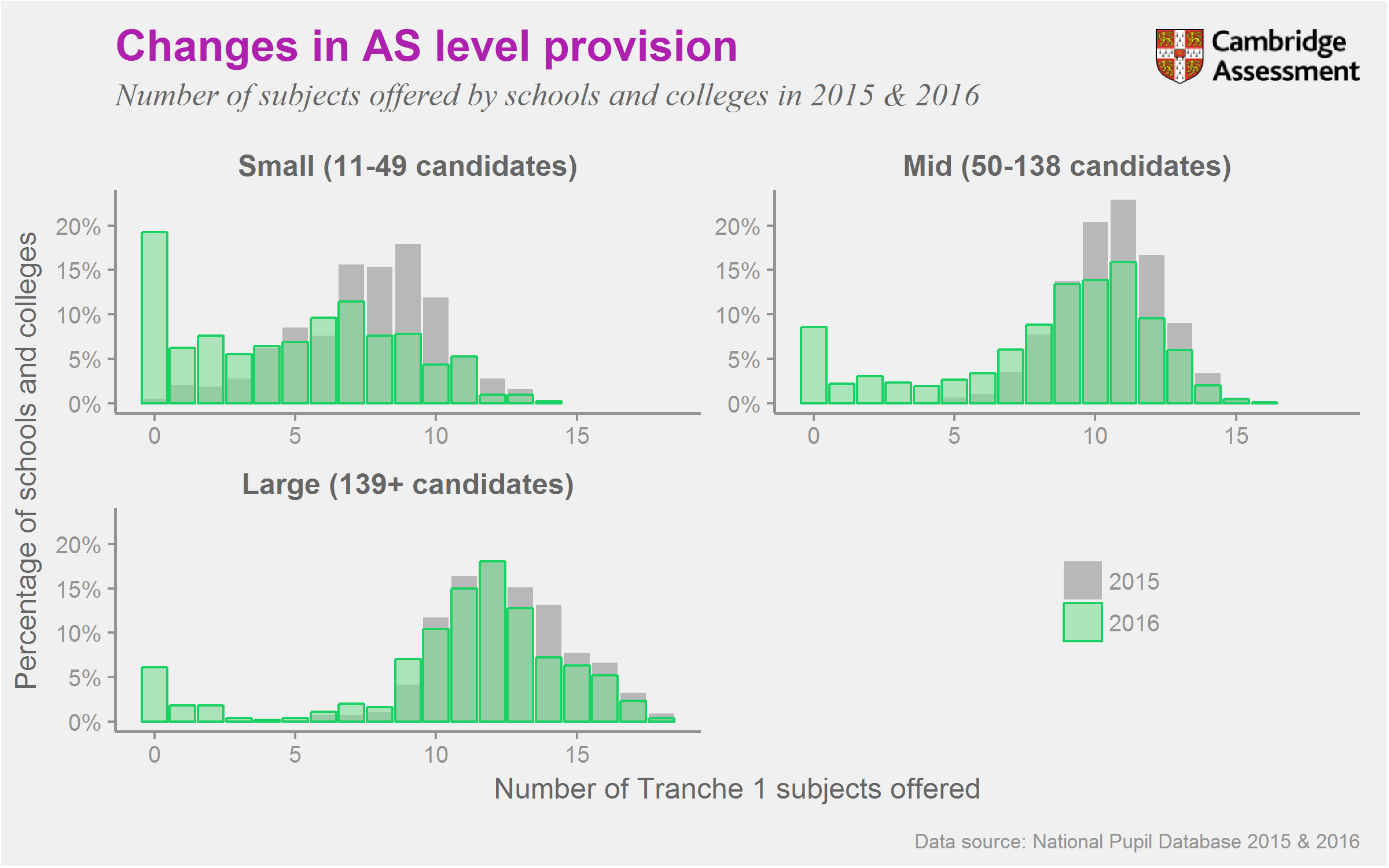Summary
Over the last few years, A and AS levels have been reformed. Assessment is now concentrated at the end of the course, rather than the previous modular system in which students were assessed throughout the course. The AS level, commonly used as a stepping-stone towards an A level in the same subject, but also as a standalone qualification giving additional breadth of study, has been ‘decoupled’ from the A level. This means that it is now no longer compulsory for students to take it on the way to an A level, and that marks in any AS level assessments do not count towards the final A level grade.
The reform has been implemented gradually, by subject. The first tranche of subjects, covering many of the high-entry subjects, were first taught from 2015, and first examined in 2016 (at AS level) and 2017 (at A level). There was a 22% drop in entries for this first tranche of subjects at AS level in 2016, with further reductions in 2017.
In this Data Byte, we look at how this reduction has been felt in individual schools and colleges by considering provision of AS levels: the number of subjects each of them offered at AS level.

What does the chart show?
The chart shows, for three size groupings of schools or colleges, the distribution of the number of Tranche 1 AS subjects offered at AS level in 2016, the first year of the reformed qualifications, compared to 2015.
The data comes from the National Pupil Database, managed by the Department for Education. In line with our series of Statistical Reports on GCSE and A level provision, we assume a school or college provides a subject if at least one student has taken the subject at AS level.
Why is the chart interesting?
This chart illustrates the diversity of ways in which schools and colleges have responded to the introduction of reformed AS levels.
Many schools and colleges kept pre-reform levels of provision, particularly the larger institutions (although the number of students taking each may have reduced).
Some schools and colleges stopped offering AS levels in all tranche 1 subjects (the tall bars at the left of the chart). This was particularly common among smaller schools.
Offering a small number of AS levels (e.g., between 1 and 6 subjects) was much less common, especially amongst larger schools and colleges. It was more common for centres either to have stopped offering AS levels altogether or to have offered large number of AS levels similar to provision sizes in the pre-reform year (2015). From this, together with other analyses carried out in our AS and A level research, we concluded that decisions on whether to offer the AS level were likely to have been made at a whole-school level rather than by individual departments.
With the further decreases in AS entry seen in 2017, it will be interesting to repeat this analysis to determine the effect on individual schools and students. If provision of the decoupled AS qualifications is lower, students may not in practice have access to them. This could reduce the breadth of students’ curricula, as well as affecting their progression to A levels.
Help us with our research!
We are conducting more research to understand the impact of the reforms on individual schools and colleges. If you are a Head of Department (or Acting Head of Department) offering AS or A levels, we would be very grateful if you could help by filling in our 15-minute online survey. After completing it, you can enter a prize draw for a £100 book token.
-
Tranche 1 subjects are: Art and Design, Biology, Business, Chemistry, Computer Science, Economics, English Language, English Language and Literature, English Literature, History, Physics, Psychology, Sociology.
-
This does not cover the scenario where a school offers a subject, but no students opt to study it.